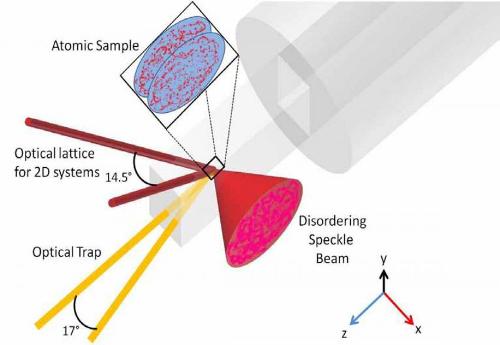Scientists at the Joint Quantum Institute (JQI) have conducted a new study to assess the relationship between disorder and quantum coherence. This may help in the development of better superconducting magnets and other quantum-based devices.
 Two thin planes of cold atoms are held in an optical lattice by an array of laser beams. Still another laser beam, passed through a diffusing material, adds an element of disorder to the atoms in the form of a speckle pattern. (Courtesy of Matthew Beeler.)
Two thin planes of cold atoms are held in an optical lattice by an array of laser beams. Still another laser beam, passed through a diffusing material, adds an element of disorder to the atoms in the form of a speckle pattern. (Courtesy of Matthew Beeler.)
Imperfections, such as impurity atoms, possess certain distinct advantages when present up to a certain level. In condensed matter physics, disorder plays a major role. Certain high temperature superconductors work only when impurity atoms of barium or yttrium are present. The scientists at JQI set up an optical lattice of rubidium (Rb) atoms and held them at a temperature near to absolute zero. They used an array of laser beams to exert the forces to hold the lattice atoms in space. These atoms are in a single quantum state as a Bose Einstein condensate. The natural inter-atomic forces do not hold these lattice atoms in space.
In the JQI experiment, the atoms are at about a micron apart. A 2-dimensional disk is a part of the atom swarm. A laser beam was made to pass through a diffusing material and made to strike a rough surface which caused it to scatter in a haphazard pattern. This visible speckle effect was used to disorganize the Rb atoms. These atoms retained their coordinated participation only up to a certain amount of disorder. To ascertain the optimum amount of disorder, the coherence was made visible.
The disk-shaped gas of atoms was pried into two parallel sheets. These will collide when the laser beams are switched off. The collision of atoms under a coherent condition will lead to a crisp interference pattern and will be visible as high-contrast dark and light stripes on a video screen.
However loss of coherence due to high disorder may lead to a washed out pattern. For certain amount of disorder, the interference pattern stays visible but with some distortion. Many vortices, which are miniature whirlpools of atoms, sprout within the gas. In superconductivity, the same types of vortices emerge, which curtails their ability to stay in a coherent state.
Matthew Beeler, a JQI scientist, states that there is a direct link between mechanism and disorder that drives a superconductor to become an insulator.